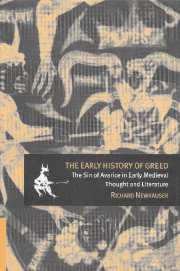Book contents
- Frontmatter
- Contents
- List of abbreviations
- Preface
- 1 Alms and ascetes, round stones and masons: avarice in the early church
- 2 Ascetic transformations I: monks and the laity in eastern Christendom
- 3 Ascetic transformations II: soaring eagles or safety in the herd – from anchoritic to cenobitic monasticism
- 4 Ascetic transformations III: the Latin West in the fourth and fifth centuries
- 5 Secularizing avarice and cupidity
- Epilogue: Future perspectives
- Appendix
- Notes
- Bibliography
- General index
- Index of names
- CAMBRIDGE STUDIES IN MEDIEVAL LITERATURE
Preface
Published online by Cambridge University Press: 22 September 2009
- Frontmatter
- Contents
- List of abbreviations
- Preface
- 1 Alms and ascetes, round stones and masons: avarice in the early church
- 2 Ascetic transformations I: monks and the laity in eastern Christendom
- 3 Ascetic transformations II: soaring eagles or safety in the herd – from anchoritic to cenobitic monasticism
- 4 Ascetic transformations III: the Latin West in the fourth and fifth centuries
- 5 Secularizing avarice and cupidity
- Epilogue: Future perspectives
- Appendix
- Notes
- Bibliography
- General index
- Index of names
- CAMBRIDGE STUDIES IN MEDIEVAL LITERATURE
Summary
About the year 420 John Cassian completed his Instituta in a monastery he had established at Marseilles. The work was meant as a response to Castor, bishop of the nearby diocese of Apt, who had requested information about the rules and ethical precepts of the almost legendary monastic centers in the East. Cassian was particularly well-informed on these issues, having spent a number of years among the semi-anchoritic and cenobitic communities of the Egyptian desert before arriving in Marseilles. Book seven of the Instituta is concerned with the spirit of “filargyria, which we can call the love of money,” which Cassian defines more precisely as follows:
And hence, not only should the possession of money be avoided, but also the very desire for it should be completely expelled from the soul. For it is not so much that the result of filargyria should be avoided as that the predisposition for it should be cut out by the roots, because it will do no good not to have money if there is a desire in us for possessing it.
Cassian thought of this evil in the first place as the desire for money, a meaning revealed in the term filargyria, the latinized transcription of a Greek word which had been made into a terminus technicus for Christian authors writing on greed. Etymologically, the term means nothing more than the “love of money,” or more literally, the “love of silver.”
- Type
- Chapter
- Information
- The Early History of GreedThe Sin of Avarice in Early Medieval Thought and Literature, pp. xi - xivPublisher: Cambridge University PressPrint publication year: 2000



